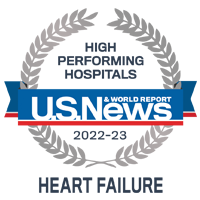
Heart Failure
Although the death rate from coronary artery disease and other heart conditions has been declining, the number of deaths from heart failure — also called congestive heart failure — is rising and is expected to balloon as the population ages.
Heart failure doesn't mean that the heart has failed or stopped. People often live healthy lives by controlling this condition, which refers to one or more chambers of the heart "failing" to keep up with the volume of blood flowing through them. Many advances in the last few decades have given doctors new tools for treating some of the underlying heart problems that can cause heart failure.
Causes of Heart Failure
Common causes of heart failure include the following:
- Damage from a prior heart attack Also called a myocardial infarction, a heart attack occurs when an artery that supplies blood to the heart is blocked so that no oxygen reaches the heart muscle. When this happens, part of the heart "dies." The medical term for the area of dead muscle is called the "infarct." The remaining, healthy tissue must take over the job of pumping blood, an extra burden that may weaken the heart's pumping ability.
- Coronary artery disease (CAD) Like all the organs and tissues of the body, the heart needs oxygen and other nutrients carried by the blood to remain healthy. When the blood vessels become narrow or clogged so that not enough blood reaches the heart, damage is done to the heart muscle, which, in turn, may affects it ability to pump blood efficiently.
The most common cause of CAD is arteriosclerosis, which is sometimes called "hardening of the arteries," a condition in which cholesterol and fatty deposits called plaque build up in the arteries. CAD also may be caused by blood clots that lodge in the arteries and interfere with blood flow. - Arrhythmia When the heartbeat is too fast, too slow, or irregular, the heart may not be able to pump enough blood. Once the underlying problem causing the irregular heartbeat is treated, the symptoms of heart failure may go away before significant damage is done to the heart muscle.
- Alcohol and drug abuse Excessive use of alcohol or drugs such as cocaine and amphetamines can damage the heart. These substances can damage the cells of the heart or prevent them from functioning, or constrict the blood vessels of the heart, resulting in raised blood pressure and heart rate. These stresses can lead to heart failure or other heart disease. Some environmental toxins and prescriptions drugs also can contribute to the problem.
- Abnormal heart valves The valves that open and close to allow blood to pass between the chambers of the heart may be damaged by disease or infection. Sometimes, heart valve defects are congenital, or present at birth. If the valves don't open or close completely with each heartbeat, the heart has to pump harder to keep the blood moving. If the workload becomes too great, heart failure can develop.
- Heart muscle disease (cardiomyopathy) or inflammation (myocarditis) Any damage to the heart muscle itself increases the risk of heart failure. Heart muscle disease or infection may be increased by birth defects, drug or alcohol abuse, bacterial or viral infections, or by other, unknown causes.
- Congenital heart defects If the heart and its chambers don't form correctly in the developing fetus, the normal parts of the heart must make up for the defects by working harder. Over time, the added stress may cause healthy structures to fail.
- Diabetes Diabetes tends to increase the levels of cholesterol and triglycerides — unhealthy fats that contribute to coronary artery disease. People with diabetes also are more likely to be overweight and have high blood pressure. These factors must be carefully monitored and controlled because they put extra strain on the heart and can lead to heart failure, as well as to other cardiovascular diseases such as heart attack and strokes.
- High blood pressure Uncontrolled high blood pressure, or hypertension, doubles a person's risk of developing heart failure. If the pressure created by blood flow through the vessels of the circulatory system is too high, the heart has to pump harder to keep the blood circulating. Over time, the extra burden can weaken the heart and eventually contribute to heart failure.
Less Common Causes
Sometimes, an otherwise healthy heart may temporarily have trouble keeping up with the body's need for oxygen and other nutrients carried by the blood because of problems unrelated to the cardiovascular system. These problems are less common than other causes for heart failure, but it is important to monitor heart function in people who have:
- Anemia It is the job of the red blood cells to carry oxygen needed to maintain life in the body's cells. If there are not enough of these cells, the heart pumps at a faster rate to circulate the smaller number of red cells quickly enough to supply the body's oxygen needs. Over time, the extra burden may lead to heart damage.
- Thyroid disorders The thyroid gland affects the rate at which the body metabolizes food and other substances. If the thyroid is overactive, a condition called hyperthyroidism, the body works at a faster pace and the heart may be overworked as it adjusts to keep up with the increased demand for oxygen and other nutrients, and the increased rate at which waste products build up that must be picked up by the circulating blood and carried to the kidneys, liver and elsewhere to be processed and excreted.
Lifestyle Factors
Lifestyle factors associated with heart disease in general also may contribute to heart failure, including:
- High cholesterol
- Cigarette smoking
- A family history of heart failure or other heart disease
Sometimes, there is no known cause for heart failure.
Our Approach to Heart Failure
UCSF is an internationally recognized leader in treating heart failure at all stages. Our program offers state-of-the-art conventional as well as experimental therapies, many of them designed right here, including lifestyle and dietary modifications, disease management, medications, electrophysiological devices, mechanical circulatory support, and heart and lung transplantation.
Our doctors, nurses, pharmacists, dietitians, physical therapists, social workers and palliative care specialists work together as a team to relieve each patient's symptoms, slow disease progression, prolong survival and improve quality of life.
Patients with advanced heart failure may benefit from mechanical circulatory support therapy. Our physicians have experience with nearly every federally approved device, so they know how to find the right approach and device for each patient. In heart failure's final stages, transplantation may be an option. UCSF's award-winning heart transplant program is one of the most active and effective in the region, having performed more than 350 transplants in the last 25 years.
Awards & recognition
-

Among the top hospitals in the nation
-

One of the nation’s best in cardiology & heart surgery
-

Rated high-performing hospital for heart failure
UCSF Health medical specialists have reviewed this information. It is for educational purposes only and is not intended to replace the advice of your doctor or other health care provider. We encourage you to discuss any questions or concerns you may have with your provider.





